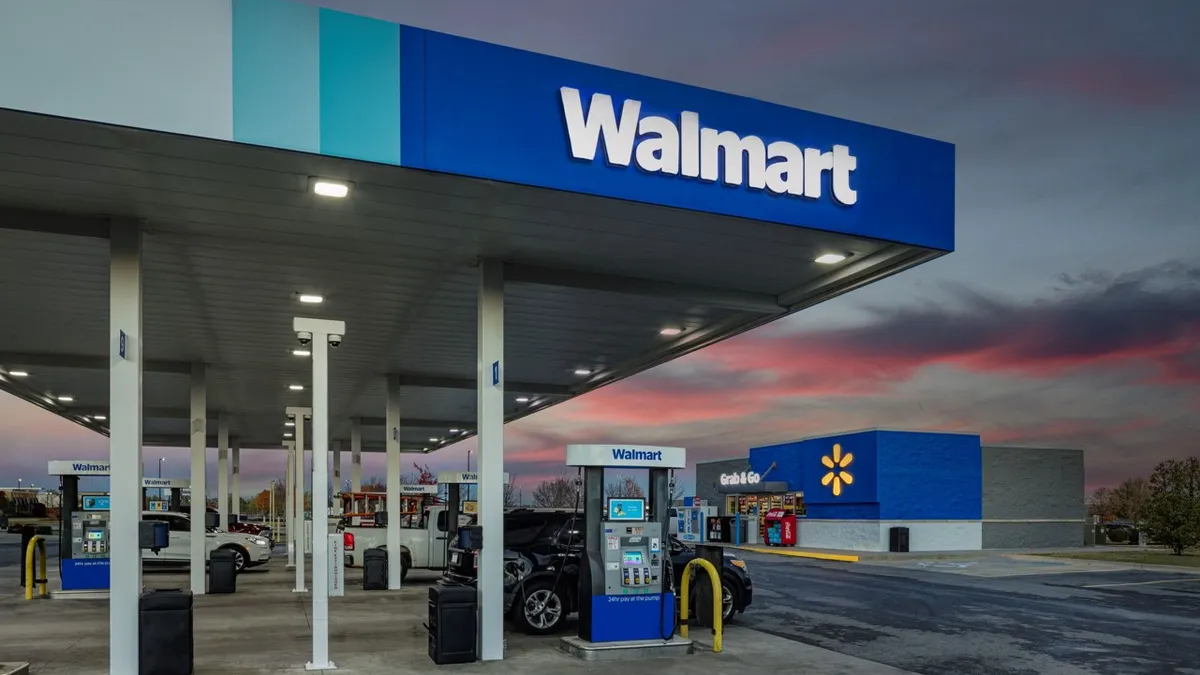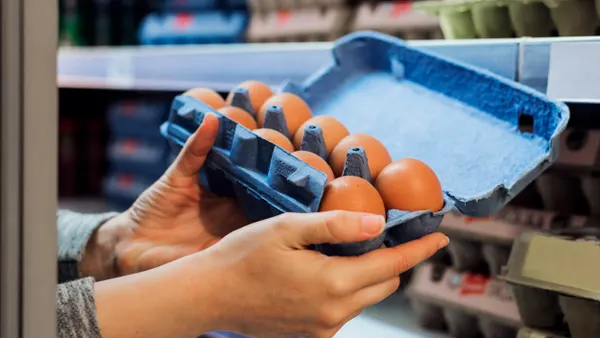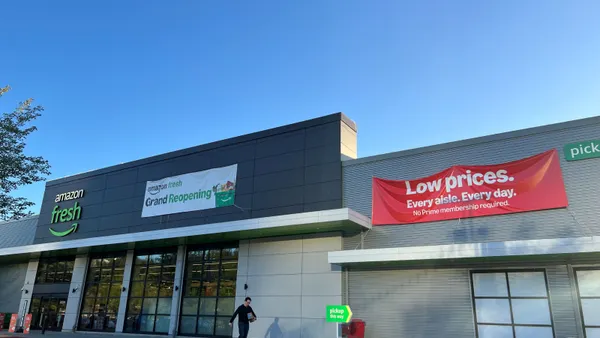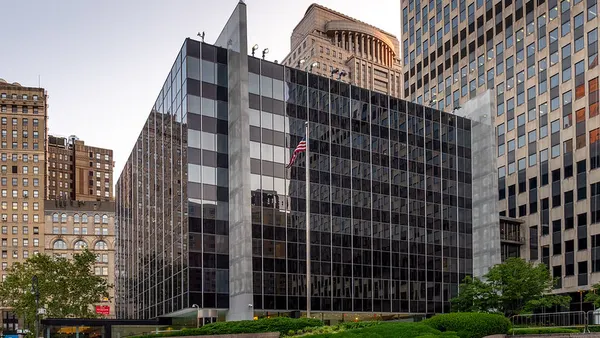When President Donald Trump signs the Farm Bill later this week, there’s about to be a lot more green in it for the food and beverage industry.
The bill, which sets farm and nutrition policy for the next five years, has a provision that would make it legal to cultivate industrial hemp — a species of cannabis — in the United States. Currently, the federal government outlaws all cannabis cultivation. The products of those plants are classified as Schedule I narcotics, defined by the Drug Enforcement Agency as substances with no currently accepted medical use and a high potential for abuse.
While hemp doesn’t have the psychoactive chemical THC, it does contain the cannabinoid CBD, which has been recognized as an aid to relaxation, anxiety and pain. The Farm Bill moves CBD out of the list of Schedule I narcotics, priming it to be the next big functional ingredient in food and beverage.
Dave Donnan, a senior partner in the consumer and retail practice of consulting firm A.T. Kearney, said the investment floodgates from food and beverage companies into hemp and CBD are about to open up.
“(Businesses) can do investments through a variety (of ways),” Donnan told Food Dive. “Private equity can get involved, venture capital can get involved. So you're going to see a lot more funds going (into the space.) ... I predict over the next two to three years, CBD products are going to grow faster than cannabis products. Just because it'll be 50-state legal, will not have the restrictions of a Schedule I narcotic and will be open to the banking system.”
In fact, according to a report on the cannabis edibles market from BDS Analytics, which specializes in granular market research on the substance, spending on cannabis edibles is expected to grow to $4.1 billion by 2022 from $1.5 billion in 2018. A study by A.T. Kearney earlier this year found four in 10 U.S. consumers said they’d be willing to try
“I think part of the reason why we see so much maturation and professionalization in the last year or two is because serious capital has started to get really interested in this and behind this.”

Troy Dayton
CEO, The Arcview Group
Use of cannabis in all forms has been legal in Canada since mid-October, and the northern neighbor has been considered a bellwether for what may happen if full legalization comes to the United States. This year, alcoholic beverage companies have made big investments in the cannabis space, touting new products for the Canadian market. In August, Constellation Brands invested $3.9 billion in cannabis company Canopy Growth.
The global alcoholic beverage giant inspired others to follow its lead. Molson Coors also announced this summer that its Canadian business formed a joint venture with Hydropothecary Corp. to make nonalcoholic, cannabis-infused drinks to sell in Canada. As part of the deal, Molson Coors Canada gained a 57.5% controlling interest in the firm. Diageo has been rumored to be in talks with Canadian cannabis companies. Rumors also swirled around Coca-Cola looking into the market, though CEO James Quincey said in October that the company had no plans to get into the market anytime soon.
In a few short years, cannabis has gone from the domain of lazy stoners to the boardrooms of big business. Troy Dayton, CEO of The Arcview Group, told Food Dive that is where it’s going to stay. Dayton works with companies and investors to prepare cannabis-related businesses for the rapidly approaching market.
“I think part of the reason why we see so much maturation and professionalization in the last year or two is because serious capital has started to get really interested in this and behind this,” Dayton said. “When you start seeing these major multinational companies starting to get interested in this, that inspires angel investors and smaller investors and also people from the big companies to leave those companies to try and start brands in an area where they see is the next big industry.”
Donnan said consumer acceptance of cannabis also is playing a big role in the food and beverage industry’s interest. The substance is legal in some form in 33 states and Washington, D.C. Donnan said that — especially in states where cannabis is legal either for medical or recreational purposes — everyone seems to know someone who has used it.
“It's been used as medicine for 2,000 years. It's only the last 100 years that we've had it under prohibition,” Donnan said. “So, this product that ... Cleopatra used and that Queen Victoria used — she used tinctures of cannabinoids — that it has benefits. More and more people are finding that they know someone that's actually benefited, hasn't got high, hasn't gone crazy. It hasn't done that, but it's actually, you know, helping them to be living their lives better.”
Everyone’s watching
Dayton said the trend toward more cannabis edibles is moving quickly — and every player in the industry is onboard. Years ago, he said, the last thing any company wanted was to have its name on a package of a product in the cannabis space. Now, everyone not only wants their company name on that package, but wants to design that package to stand out so consumers will notice the brand name.
“There's not a single large CPG company in the world that doesn't have somebody, and in some cases, an entire team evaluating the cannabis sector right now,” Dayton said.
“Many of them are really following in the footsteps of figuring out how to play in this. ...That's sort of what's happening from the top. What's happening from the bottom is a lot of brands are getting started. Pretty much every day, you've got new brands getting started.”
Jessica Lukas, vice president of consumer insights at BDS Analytics, told Food Dive that legalization of CBD is going to make it ubiquitous on grocery store shelves — at least in the beginning.
“I think we're going to see CBD in every product form, you know? Bread and crackers and candy and granola and beverages,” she said.
But, she said, that will just be a fad. Consumer preference will dictate the products that keep their CBD formulations, and it won’t be added to everything.
“I think we're going to see CBD in every product form, you know? Bread and crackers and candy and granola and beverages.”

Jessica Lukas
Vice president of consumer insights, BDS Analytics
Donnan predicted the products that will be successful with CBD will be those usually associated with health and wellness — which is an easy way to brand it. He said it is likely to be in items like granola bars, waters and other wellness beverages.
“I don't see it put on chicken or, you know, put into Jell-O,” he said.
Lukas said the new brands getting started are going to be where most of the visible growth in the cannabis space will come from at the beginning.
“I think we're gonna see a lot of moves by big players,” she said. “Whether they do it outwardly, whether they do it, I don't believe a lot of them will likely do it under their core brands. ... I think it would be great in terms of consumer education if they would, but that's likely not going to happen. I think you'll see newer, smaller brands emerge that you'll likely only know they're from a big company if you look at the bottom of the back label. And then you might see some acquisitions in brands that already exist today.”
Dayton agreed, saying small brands are likely to be the biggest movers — though he predicted that some of the larger food companies will work with hot CBD startups through their incubator and venture capital arms.
Coming to a shelf near you?
However, just because the U.S. is creeping toward cannabis legalization doesn’t mean Big Food will start selling its well-known products with CBD in the next couple of months — even after Trump approves the Farm Bill.
After all, Donnan said, the food business is slow to adapt ingredients that consumers might be hesitant to accept. Science has shown the effectiveness of probiotics for many years, yet it’s only been recently that they have appeared outside of expected sources such as yogurt, he said. Other hyped-up functional ingredients, such as turmeric, also haven’t necessarily appeared in starring roles in many items.
But neither probiotics nor turmeric were ever an illegal drug and considered dangerous — something any cannabis product will face.
“There's all these tactical things that 2019 will be the year to work through,” Donnan said.
As soon as hemp becomes legal, the FDA will gain purview over CBD — and may require studies and clinical trials to determine things like how much of a dose is recommended. The agency also could require a standard of what constitutes quality CBD extracts for food and beverage.
“I know that the growing is going to be legal, but the consumption side of things, I think we still need some regulatory framework there to make sure that it's not going to be harmful and that we don't see a bunch of ... product coming into the market that's substandard,” Donnan said.
Additionally, because the substance was illegal, there was little medical research done on its benefits or drawbacks. Food companies also have not had much of a chance to work on formulating products with it.
Donnan said it might actually be beneficial to the market if the FDA takes a measured approach to how to regulate CBD in food and drink. Slow and deliberate approval means there will be exact rules and guidelines put into place. This means fewer products sped to shelves without proper vetting, testing and sourcing. Early products with substandard CBD or unpleasant tastes and textures could turn consumers away from the ingredient altogether, killing the buzz of the hot and functional ingredient.
Drinking to legalization
The shifting conversation around legalizing cannabis comes at a perfect time for the alcohol industry, which has been losing sales and traction.
“I think alcohol companies are wise to be very interested in investing in this sector as a hedge,” Dayton said. “Also, I think they're already in that space because millennials are just totally changing the landscape of how people consume alcohol and beverages. They're just not drinking as much as previous generations and they're much more interested in their health and all these other things. So cannabis plays right into that larger conversation as well.”
Donnan said it makes sense for alcohol companies to try to hedge sales losses to beer with cannabis. After all, cannabis can give a euphoric effect like alcohol with no calories, no impact to the liver and no possibility of a hangover. Plus, he said, beer has the added bonus of being somewhat filling — meaning consumers aren’t going to consume too many in a single sitting and potentially overdose on cannabis.
Several beverages from beer companies are currently on the market in limited areas. Lagunitas Brewing, part of Netherlands-based Heineken, has its SuperCritical, an IPA made with aromatic marijuana terpenes, available in California. Ceria is launching THC brew Grainwave in California. Meanwhile, Constellation and Molson Coors are still working on their brews. Two Roots Brewing also has launched its nonalcoholic “cannabier” in Nevada.
Lukas said alcohol is currently consumed in social situations where consumers are looking for a bit of euphoria — making beer a perfect place for cannabis to make an appearance. There is no expectation of a different sort of function — and many consumers would be interested in a “healthier” way to drink.
What’s next?
While de facto CBD legalization may be days away, the impact of cannabis on food and beverage will continue to manifest itself in the market during the coming years.
Dayton said the industry is just beginning to scratch the surface of what’s possible in food and beverage. Lukas agreed, especially because right now, most consumers vastly prefer inhaling cannabis.
Additionally, THC and CBD are just two of several cannabinoids available from related plants. All of these chemicals may have different impacts on people, though not much research has been done yet.
“If every other product category only has two dimensions and cannabis has five dimensions, imagine all the different types of products that are going to be birthed from that — and how much that is going to disrupt so many different product categories,” Dayton said.
Lukas said BDS Analytics is projecting full U.S. legalization of all forms of cannabis by 2021 — based on public opinion through state legalization issues, federal government sentiment and momentum elsewhere. She said manufacturers will be working on how to properly dose cannabis products for consumers through edible means. Until now, consumers have been looking for larger doses of the substance in edible products, like a full dose in a single gummi bear.
“If every other product category only has two dimensions and cannabis has five dimensions, imagine all the different types of products that are going to be birthed from that — and how much that is going to disrupt so many different product categories.”

Troy Dayton
CEO, The Arcview Group
Donnan said many adjacent industries will see more business as additional cannabis products hit the market. The products will need to be meticulously tracked — both so they don’t go missing and so they are traceable. Blockchain-type services can make this happen. Items will need to be tested for purity and effectiveness before going on the market, bringing more business to labs. And new forms of childproof packaging will be vital, inviting more innovation on that front.
According to the Pew Research Center, the number of Americans favoring full legalization is growing steadily. As of October, 62% wanted it to happen.
“Wouldn't that be amazing if cannabis was the thing that really healed this country right now? ...You know? The hippies are right again," Dayton said.














